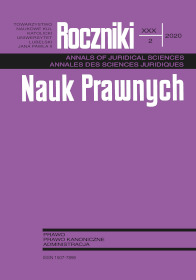Grotius Law Systematics
Abstract
The subject of this article is rendering of law conception presented in Hugo Grotius (1583-1545) learning enclosed in his main work Ius belli ac pacis libri tres (1625). The Grotius law conception that have been had its own systematics was based however not on normative settlements or statements of law regulations serving in juridical practice and also didactics whereas it was construction of law resulting of ideological premises containing law principles and rules being the express of philosophical and theological approach of Grotius to law. Grotius law systematics built on hierarchic order of laws existed on the levels of law from the highest placed and having widest extent law of nature to expanded and differentiated positive law had still also in Grotius understanding a practical meaning. It was a construction of law order existing and functioning in social relations reflecting a certain natural order being an essential element consciousness of men adhering to it. In this approach to law and law order Grotius has been seen the fundamental purpose of his intention.
References
Besselink Leonard: ‘The Impious Hypothesis Revisited’, “Grotiana” 9 (1988), s. 3-63.
Chroust Anton-Hermann: Hugo Grotius andtheScholastic Natural Law Tradition, “The New Scholasticism. A Quaterly Review of Philosophy” 17(1943), nr 2, s. 101-133.
Eikema Hommes Hendrik J. van: Naturrecht und positives Recht bei Johannes Althusius, [w:] Politische Theorie des Johannes Althusius, Hrsg. Karl-Wilhelm Dahm, Werner Krawietz, Dieter Wyduckel, Berlin: Duncker& Humblot 1988, s. 371-390.
Feenstra Robert: Quelquesremarques sur le sources utilisées par Grotius danssestravaux de droit naturel, [w:] The world of Hugo Grotius (1583-1645), Proceedings of the International Colloquium Organized by the Grotius Committee of the Royal Netherlands Academy of Arts and Sciences, Rotterdam 6-9 April 1983, Amsterdam: Holland University Press 1984, s. 65-81.
Finnis John: Natural Law and Natural Rights, Oxford: Oxford Clarendon Press 1980.
Gierke Otto: Johannes Althusius und die Entwicklung der naturrechtlichen Staatstheorien, Breslau: Verlag M. und H. Marens 1902.
Grotius Hugo: De iure belli ac pacis libri tres. In quibus ius naturae & Gentium, item juris publici praecipua explicantur, Amsterdam 1646, Liber I, Caput 1.10.
Grunert Frank: Normbegründung und politische Legimität. Zur Rechts- und Staatsphilosophie der deutschen Frühaufklärung, Tübingen: Max Niemeyer Verlag 2000.
Haakonssen Knud: Natural Law and Moral Philosophy: From Grotius to the Scottish Enlightenment, Cambridge: Cambridge University Press 1996.
Haakonssen Knud: The Moral Conservatism of Natural Rights, [w:] Natural Law and Civil Sovereignty. Moral Right and State Authority in Early Modern Political Thought, ed. Ian Hunter, David Saunders, Houndmills: Palgrave Macmillan 2002, s. 28-33.
Haggenmacher Paul: Genèse et signfication du koncept de „iusgentium” chez Grotius‘, “Grotiana” 2 (1981), s. 44-102, appendices s. 631-643.
Haggenmacher Paul: Droits subjectifs et systèmejuridique chez Grotius, [w:] Politique, droit et théologie chez Bodin, Grotius et Hobbes, Préface de Yves Charles Zarka, Paris: Éditions Kimé 1997, s. 73-78.
Hervada Javier: The Old and the New in the Hypothesis “Etiamsidaremus” of Grotius, “Grotiana” 4 (1983), s. 3-20.
Holthöfer Ernst: Die Literatur zum gemeinen und partikularen Recht in Italien, Frankreich, Spanien und Portugal, [w:] Handbuch der Quellen und Literatur der neueren europäischen Privatrechtsgeschichte, Bd. 2, Tlbd. 3, Hrsg. Helmut Coing, München: C.H. Beck 1977, s. 103-500.
Hölzel Christian: Grundlagen des Rechts – und Staatsdenkens bei Hugo Grotius, München 1970.
Knieper Barbara: Die Naturrechtslehre des Hugo Grotius als Einigungsprinzip der Christenheit, dargestellt an seiner Stellung zum Calvinismus, Frankfurt / Main: Johann-Wolfgang Universität zu Frankfurt am Main 1971.
Leger James St.: The “etiamsidaremus” of Hugo Grotius. Study in the Origins of International Law, Romae: Pontificum Athaeneum Internationale 1962.
Link Christoph: Herrschaftsordnung und bürgerliche Freiheit. Grenzen und Staatsgewalt in der älteren deutschen Staatslehre, Wien: Böhlau 1979.
Ottenwälder Paul: Zur Naturrechtslehre des Hugo Grotius, Tübingen: J. C. B. Mohr 1950.
Pound Roscoe: Grotius in the Science of Law, “American Journal of International Law” 19 (1925) 4, s. 685-688.
Sauter Johannes: Die philosophischen Grundlagen des Naturrechts. Untersuchungen zur Geschichte des Rechts – und Staatslehre, Frankfurt/Main: Verlag Sauer und Auermann 1966 [unveränd. Aufl. Wien 1932].
Scattola Merio: Das Naturrecht vor dem Naturrecht. Zur Geschichte des „iusnaturae” im 16. Jahrhundert, Tübingen: Max Niemeyer Verlag 1999.
Schnepf Robert: Naturrecht und Geschichte bei Hugo Grotius. Ein methodologischer Problem rechtsphilosophischer Begründung, „Zeitschrift für Neuere Rechtsgeschichte” 20 (1998), nr 1-2, s. 1-14.
Söllner Alfred: Die Literatur zum gemeinen und partikularen Recht in Deutschland, Österreich, Niederlanden und der Schweiz, [w:] Handbuch der Quellen und Literaturder neueren europäischen Privatrechtsgeschichte, Bd. 2, Tlbd. 3, Hrsg. Helmut Coing, München: C.H. Beck 1977, s. 501-614.
Strömholm Stig: Grotius och den tidigarenaturrätten, [w:] Den svenskajuridikensuppblomstring i 1600-talets politiska, kulturella och religiösastormaktssamhälle, red. Göran Inger, Stockholm: A.B. NordiskaBokhandeln 1984, s. 94-95.
Tierney B.: The Idea of Natural Rights. Studies on Natural Rights, Natural Law and Church Law 1150-1625, Atlanta: Scholars Press 1997;
Tuck Richard: Grotius, Carneades and Hobbes, “Grotiana” 4 (1983), s. 43-62.
Tuck Richard: Philosophy and Government 1572–1651, Cambridge: Cambridge University Press 1993.
Wieacker Franz: Privatrechtsgeschichte der Neuzeit unter besonderer Berücksichtigung der deutschen Entwicklung, Göttingen: Vandenhoeck& Ruprecht 1952.
Winters Paul J.: Die „Politik“ des Johannes Althusius und ihre zeitgenössischen Quellen. Zur Grundlegung der politischen Wissenschaft im 16. und im beginnenden 17. Jahrhundert, Freiburg im Breisgau: Verlag Rombach 1963.
Zajadło Jerzy: Hugo Grocjusz i hipoteza etiamsi daremus, non esse Deum, „Czasopismo Prawno- Historyczne” 58 (2006), z. 1, s. 208-209.
Copyright (c) 2020 Roczniki Nauk Prawnych

This work is licensed under a Creative Commons Attribution-NonCommercial-NoDerivatives 4.0 International License.


